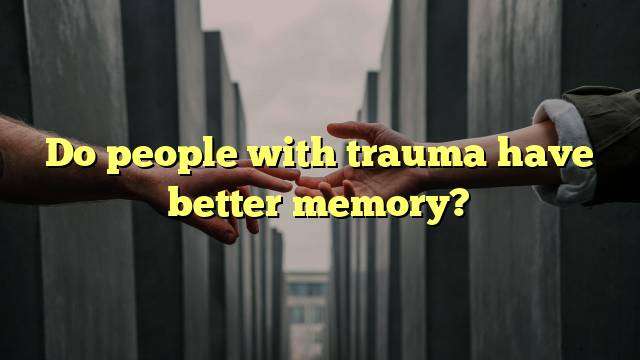Do People With Trauma Have Better Memory?
Trauma can have a significant impact on an individual’s memory and cognitive functioning. This article will explore how trauma affects memory, the potential impacts of trauma on memory, and how people with trauma can improve their memory.
What is Trauma?
Trauma is an emotional response to a traumatic event or experience. It can be caused by a single incident, or by multiple incidents over a long period of time. Common causes of trauma include physical or sexual abuse, witnessing violence, natural disasters, war, and other traumatic events. Trauma can have long-term effects on an individual’s mental and physical health, and can even affect their memory.
How Does Trauma Affect Memory?
Trauma can have a significant impact on an individual’s memory and cognitive functioning. Trauma can shut down episodic memory and fragment the sequence of events. This is because the hippocampus, which is responsible for creating and recalling episodic memory, becomes overwhelmed and unable to process information properly. Additionally, trauma can prevent information (like words, images, sounds, etc.) from different parts of the brain from combining to make a semantic memory.
Furthermore, trauma can also lead to dissociation, which is a state of disconnection from oneself that can lead to memory problems. In some cases, an individual may experience memory problems that are so severe that they are unable to recall the traumatic event. This is referred to as dissociative amnesia, and it is a common symptom of post-traumatic stress disorder (PTSD).
Impact of Trauma on Memory
The impact of trauma on memory can be significant and long-lasting. Memory problems caused by trauma can lead to difficulty concentrating and making decisions, difficulty forming new memories, and difficulty understanding and processing information. Additionally, trauma can also cause an individual to have difficulty retrieving memories, and can even lead to memory loss.
Treating Memory Loss Associated with Trauma
There are several treatments available for individuals who experience memory loss associated with trauma. Cognitive-behavioral therapy (CBT) is one of the most popular treatments for trauma-related memory issues. CBT focuses on helping individuals understand and cope with their traumatic experiences. Additionally, it can help individuals to learn ways to manage their symptoms and improve their memory.
Other treatments for trauma-related memory problems include medications, such as antidepressants and antipsychotics, and psychotherapy. Additionally, some individuals may benefit from alternative treatments, such as yoga, meditation, and art therapy.
How to Improve Memory for People With Trauma
There are several steps that individuals with trauma can take to improve their memory. First, it is important to seek treatment from a mental health professional, such as a psychologist or psychiatrist. Treatment can help individuals understand their traumatic experiences, manage symptoms, and develop coping skills.
In addition to seeking treatment, individuals with trauma can also take steps to improve their memory. These steps include:
- Creating a routine and sticking to it
- Exercising regularly
- Eating a healthy diet
- Getting enough sleep
- Practicing relaxation techniques, such as meditation or yoga
- Limiting or avoiding alcohol and other substances
- Using memory aids, such as writing down important information or using reminders
- Engaging in activities that require concentration, such as puzzles or games
Additionally, individuals with trauma can also use cognitive strategies to improve their memory. These strategies include visualization, mnemonics, and chunking. Visualization involves creating a mental image of the information that needs to be remembered. Mnemonics involve creating a memorable phrase or connection between related words or concepts. Finally, chunking involves breaking down complex information into smaller, more manageable chunks.
Conclusion
Trauma can have a significant impact on an individual’s memory and cognitive functioning. Trauma can shut down episodic memory and fragment the sequence of events. Additionally, trauma can lead to dissociation, which can lead to memory problems. The impact of trauma on memory can be significant and long-lasting.
However, there are treatments and strategies available to help individuals with trauma improve their memory. These treatments and strategies include cognitive-behavioral therapy, medications, psychotherapy, and alternative treatments. Additionally, individuals with trauma can also use cognitive strategies, such as visualization, mnemonics, and chunking, to improve their memory. By taking steps to seek treatment and using strategies to improve their memory, individuals with trauma can manage their symptoms and improve their cognitive functioning.


